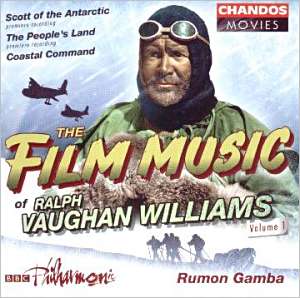************************************************************** EDITOR’s CHOICE (Historical) November 2002 **************************************************************
Compilation:
The Film Music of Ralph VAUGHAN WILLIAMS (Vol. 1) Scott of the Antarctic *; The People's Land; Coastal Command
Merryn Gamba (soprano) * Sheffield Philharmonic Chorus
Rumon Gamba conducting the BBC Philharmonic
CHANDOS CHAN 10007 [78:30]
Crotchet Amazon UK Amazon US

Chandos' distinguished British Film Music series at last reaches Ralph Vaughan Williams with a first volume that highlights the complete score for the 1948 Ealing Films production of Scott of the Antarctic, starring Sir John Mills in the title role.
Vaughan Williams wrote a score of 996 bars of which only 462 were utilised in the film (some of these more than once of course). This recording is therefore doubly welcome for it affords the opportunity, at last, to appreciate the scale of RVW's achievement. And we can appreciate all the more why he had such a sufficiency of material to inspire him to create his Sinfonia Antartica (his Symphony No. 7 first performed in 1953) rather than merely a concert suite. In fact this marvellous spirited performance, delivered in spectacular sound, has ten cues out of a total of eighteen that are premiere recordings. We hear, for instance, two emotionally laden tracks 'Doom' and 'Sculpture Scene' in which, in the former, Scott meets Wilson's wife Oriana and misleads her and Wilson into thinking he is planning a mainly scientific expedition and the latter (not used) for a scene between Scott and his sculptress wife.
Vaughan Williams' evocation of the cruel, icy waste lands, is vividly evocative, capturing the glittering ice flows and the dangerous awesome grandeur of the glacier using a deep organ pedal underlining. The soprano soloist (Merryn Gamba) and a small chorus of women's voices wordlessly convey the biting chill of this hostile environment. The 'Aurora' presents the majesty of a crystal-clear, star-bejewelled polar night sky, while some humorous relief comes in an amusing portrait of pompous-looking but wobbly penguins. One of the most effective cues is 'Blizzard' again using voices – and a wind machine –to create a most convincing portrait of a terrifying, blinding white terror. The death of Evans and Oates is an affecting elegy. Unlike the Symphony, the film score ends on a heroic upbeat, for, after all, Scott was regarded as a national hero.
Coastal Command here receives a more energetic and convincing reading than the 1990 Silva Screen recording (FILMCD 072) made by Kenneth Alwyn and the Philharmonia Orchestra (this interesting album also includes music by Arthur Bliss for the film Conquest of the Air and Brian Easdale's The Red Shoes ballet music, the latter is particularly recommended). The music for Coastal Command is derivative of RVW's concert music, particularly of his Fifth and Sixth symphonies yet it sympathetically evokes the aspirations and dangers of the crews of the Sunderland and Hudson flying boats that patrolled the waters off Iceland and across the North Sea in search of hostile German shipping during World War II, the subject of this Crown Film Unit documentary. Such cue titles as 'U-boat Alert', 'Taking Off at Night', 'Dawn Patrol (Quiet Determination)' and 'Battle of the Beauforts' suggest the varying moods of the music.
The People's Land was another documentary film (first shown in 1943), this time about the work of the National Trust. RVW's score is chiefly based on folk songs – among them 'John Barleycorn'; 'The Springtime of the Year'; and 'Love will find out the way'; together with linking motifs that illustrates places and pastimes such as the White Cliffs of Dover and the Lake District, and cycling, walking and climbing.
An excellent introduction to the evocative film music of Vaughan Williams, especially important for presenting the full score of Scott of the Antarctic. Thrilling, evocative performances captured in the best Chandos sound.
Ian Lace

Return to Index